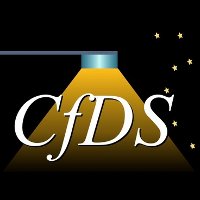Aims of the Commission for Dark Skies
The CfDS wants to see:
- Greater use of modern fittings which control the light emitted and warm colour temperature light sources, to minimise sky-glow and light trespass.
- The right amount of light for the task, not wasteful over-lighting.
- Sensible wattages are needed. A 40W equivalent light will adequately illuminate the average driveway and garden.
- Controls on floodlighting of buildings, sports facilities, etc., with appropriate switching, shielding, baffles and mounting adaptation, causing lamps to shine where the light is actually needed, and only when needed.
- Instructions about sensitive mounting, and information about light intrusion and other possible adverse effects, in the packaging of all exterior lights.
The CfDS believes that:
- Astronomers have the same lighting needs as everyone else.
- If part-night switch-offs of streetlights prove beneficial, they should continue.
- Everyone should have the right to illuminate their premises at night if they so wish, as long as it does not intrude into neighbouring properties.
- Lamps used should comply with Institution of Lighting Professionals' guidelines, with 150W as a maximum value for typical domestic and small-scale commercial premises.
- In the absence of proper regulation of light, which is as much of a potential pollutant as noise and other impactors, manufacturers and retailers should take the lead in preserving a sensitively lit night-time environment.
- The promotion of outdoor lighting should concentrate on aspects of visibility and careful lighting, rather than making debatable claims about crime deterrence and links between between brightness and effectiveness.
What we do
- The CfDS is in constant contact with both local and central government (especially the Highways Agency and DEFRA), the lighting industry, environmental organisations and other groups promoting dark night skies both in the UK and abroad.
- Large numbers of modern, downward-directed road lights are now seen on our roads and we continue to monitor their impact.
- Lighting manufacturers have publicly acknowledged CfDS' important role in recent better lighting trends.
- The CfDS' local officers are contact points for public comment on lighting and the night sky. We reward good lighting practice and publicise the bad.
Other CfDS Activities include:
- Producing light-pollution information leaflets, posters, Web and Facebook material.
- Attending astronomy and other public outreach events and exhibitions in order to gain public support and influence decision makers.
- Supporting areas seeking protected Dark-Sky status.
- Working with the Institution of Lighting Professionals to achieve ever higher standards for low-pollution installations.
- Supporting and contributing to the evolving science of Artificial Light at Night (ALAN) by encouraging research and information exchange and attending ALAN events worldwide.
- Liaising with other influential rural affairs and wildlife groups.
- Ensuring constant engagement with both local and national governments with a view to the night sky eventually receiving the protection it deserves as an area of outstanding natural beauty and a site of special scientific interest.
The Commission for Dark Skies believes that the control of light pollution is an idea whose time has come. In an era when the environment, energy considerations and the surge in discoveries about the Universe are matters of everyday discussion, it makes sense to reclaim our heritage above.

